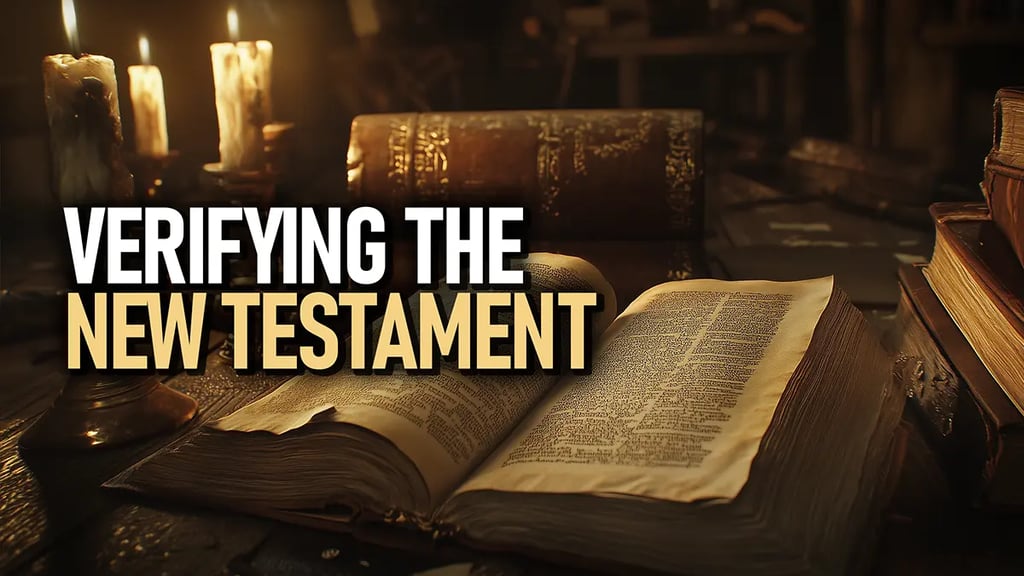Verifying The New Testament


The Gospels fulfill Old Testament prophecy, typology, and covenants, demonstrating them as a legitimate continuation of the Old Testament canon. These alignments provide theological and prophetic validation of their place in the Holy Scriptures.
Luke also wrote the book of Acts.
BOOKS CONFIRMED: MATTHEW, MARK, LUKE, JOHN, ACTS
Verifying The Apostles
Acts 2:42 – And they continued stedfastly in the apostles' doctrine and fellowship, and in breaking of bread, and in prayers.
2 Peter 3:2 – That ye may be mindful of the words which were spoken before by the holy prophets, and of the commandment of us the apostles of the Lord and Saviour:
VERIFIED: 1 PETER, 2 PETER, 1 JOHN, 2 JOHN, 3 JOHN, REVELATION
Verifying Paul's Epistles
Peter recognized Paul’s writings including his epistles as inspired by God and equated them with “the rest of the Scriptures”.
2 Peter 3:15-16 – And account that the longsuffering of our Lord is salvation; even as our beloved brother Paul also according to the wisdom given unto him hath written unto you; As also in all his epistles, speaking in them of these things; in which are some things hard to be understood, which they that are unlearned and unstable wrest, as they do also the other scriptures, unto their own destruction.
The church of Thessalonica received Paul’s word as the Word of God.
1 Thessalonians 2:13 – For this cause also thank we God without ceasing, because, when ye received the word of God which ye heard of us, ye received it not as the word of men, but as it is in truth, the word of God, which effectually worketh also in you that believe.
Paul’s epistles were circulating among the churches.
Colossians 4:16 – And when this epistle is read among you, cause that it be read also in the church of the Laodiceans; and that ye likewise read the epistle from Laodicea.
Paul acknowledges he is writing scripture.
Ephesians 2:19-20 – Now therefore ye are no more strangers and foreigners, but fellowcitizens with the saints, and of the household of God; And are built upon the foundation of the apostles and prophets, Jesus Christ himself being the chief corner stone;
2 Thessalonians 3:6 – Now we command you, brethren, in the name of our Lord Jesus Christ, that ye withdraw yourselves from every brother that walketh disorderly, and not after the tradition which he received of us.
1 Thessalonians 2:13 – For this cause also thank we God without ceasing, because, when ye received the word of God which ye heard of us, ye received it not as the word of men, but as it is in truth, the word of God, which effectually worketh also in you that believe.
Paul quotes both Luke and the Old Testament
1 Timothy 5:18 – For the scripture saith, Thou shalt not muzzle the ox that treadeth out the corn. And, The labourer is worthy of his reward (misthos: pay for service [literally or figuratively], good or bad: - hire, reward, wages).
Luke 10:7 – And in the same house remain, eating and drinking such things as they give: for the labourer is worthy of his hire (misthos). Go not from house to house.
Deuteronomy 25:4 – Thou shalt not muzzle the ox when he treadeth out the corn.
Verifying Hebrews
Tertius identifies himself as the one who wrote down the letter to the Romans, not the one who authored it. This means he was likely a scribe for Paul the Apostle, the author of the book of Romans.
Romans 16:22 – I Tertius, who wrote this epistle, salute you in the Lord.
Romans 1:1 – Paul, a servant of Jesus Christ, called to be an apostle, separated unto the gospel of God,
The KJV 1611 mentions that Timothy was the scribe for the book of Hebrews.
Hebrews 13:25 – Grace be with you all. Amen. Written to the Hebrews from Italy, by Timothy.
Paul traveled with Timothy.
Here, Paul decides to take Timothy along on his journey, marking the beginning of Timothy’s partnership with him.
Acts 16:1-3 – Then came he to Derbe and Lystra: and, behold, a certain disciple was there, named Timotheus, the son of a certain woman, which was a Jewess, and believed; but his father was a Greek: Which was well reported of by the brethren that were at Lystra and Iconium. Him would Paul have to go forth with him; and took and circumcised him because of the Jews which were in those quarters: for they knew all that his father was a Greek.
After staying back briefly in Berea, Timothy later joins Paul again in Athens.
Acts 17:14-15 – And then immediately the brethren sent away Paul to go as it were to the sea: but Silas and Timotheus abode there still. And they that conducted Paul brought him unto Athens: and receiving a commandment unto Silas and Timotheus for to come to him with all speed, they departed.
Paul mentions Timothy as one of his co-workers.
Romans 16:21 – Timotheus my workfellow, and Lucius, and Jason, and Sosipater, my kinsmen, salute you.
Paul is most likely the author of Hebrews.
Hebrews 13:23 – Know ye that our brother Timothy is set at liberty; with whom, if he come shortly, I will see you.
Even the KJV translators write in the title “The Epistle Of Paul The Apostle To The Hebrews”
Peter is confirming that Paul had also written a letter to the Hebrews.
2 Peter 3:15 – And account that the longsuffering of our Lord is salvation; even as our beloved brother Paul also according to the wisdom given unto him hath written unto you;
Peter also wrote to the Hebrews, which were scattered in other nations.
1 Peter 1:1 – Peter, an apostle of Jesus Christ, to the strangers scattered throughout Pontus, Galatia, Cappadocia, Asia, and Bithynia,
BOOKS CONFIRMED: MATTHEW, MARK, LUKE, JOHN, ACTS, ROMANS, 1 CORINTHIANS, 2 CORINTHIANS, GALATIANS, EPHESIANS, PHILIPPIANS, COLOSSIANS, 1 THESSALONIANS, 2 THESSALONIANS, 1 TIMOTHY, 2 TIMOTHY, TITUS, PHILEMON, HEBREWS
Verifying James and Jude
James and Jude were also the brothers of Jesus.
Galatians 1:19 – But other of the apostles saw I none, save James the Lord's brother.
Jude 1:1 – Jude [Ioudas, Judas], the servant of Jesus Christ, and brother of James, to them that are sanctified by God the Father, and preserved in Jesus Christ, and called:
By identifying himself as "a brother of James," Jude is likely referring to James, another of Jesus' half-brothers, who was also a prominent leader in the early Jerusalem church. Jude’s identification of himself as a “servant of Jesus Christ” instead of explicitly calling himself Jesus' brother suggests humility and a recognition of Jesus’ divine status.
Matthew 13:55 – Is not this the carpenter's son? is not his mother called Mary? and his brethren, James, and Joses, and Simon, and Judas [Ioudas, Jude]?
Mark 6:3 – Is not this the carpenter, the son of Mary, the brother of James, and Joses, and of Juda [Ioudas, Jude, Judas], and Simon? and are not his sisters here with us? And they were offended at him.
The other Jude, one of the twelve apostles, is also called “Judas of James” (Luke 6:16, Acts 1:13). Most scholars interpret “Judas of James” to mean “Jude, son of James.” He is also referred to as "Thaddaeus" or "Lebbaeus" (Matthew 10:3, Mark 3:18) to distinguish him from Judas Iscariot.
BOOKS CONFIRMED: ALL 27 BOOKS OF THE NEW TESTAMENT
I created a comprehensive guide covering every topic, with every verse you need, download here. If you would like to support my ministry you can do so by donating here or subscribing to my Patreon.
Grace be with all them that love our Lord Jesus Christ in sincerity. Amen.
- The Christian King


